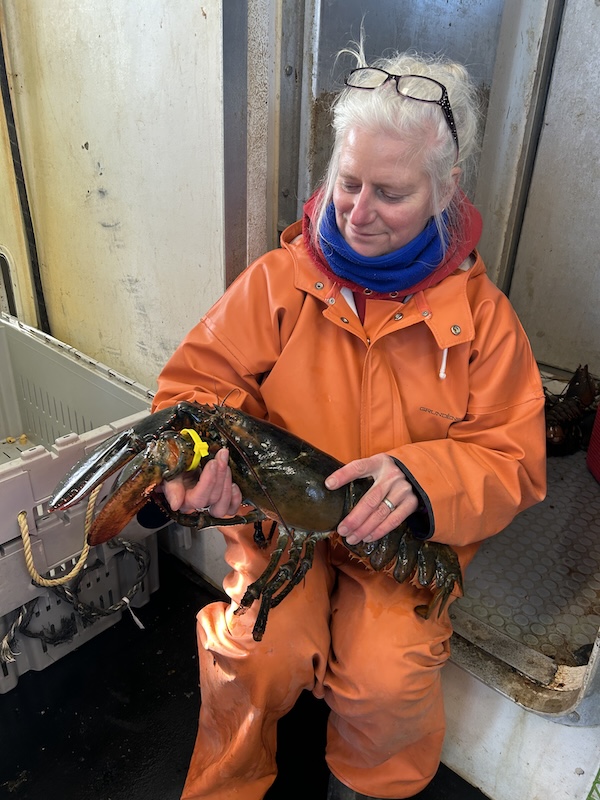

KENNESAW, Ga. | Oct 20, 2025

In August, the dean of Kennesaw State University’s College of Science and Mathematics’ research into the migratory and reproductive habits of lobsters in the Bay of Fundy yielded something remarkable – a lobster she tagged near the island of Grand Manan, New Brunswick, found her way to Cape Cod, Massachusetts, around 220 miles away.
Female lobsters generally stay in the same area for their lifetimes, and since they don’t travel in straight lines, this lobster likely took a winding path toward her destination, Koopman said.
“When this lobster went from my study area to Cape Cod, I had people asking me why,” she said. “It could be traveling, it could be looking for food, or it could be seeking out a certain water temperature. There are so many factors that could have driven that lobster to go that far.”
Koopman has worked at the Grand Manan Whale and Seabird Research Station for more than 30 years, since her undergraduate days at Canada’s University of Guelph. One summer, armed with a scholarship for a summer research project, she sought out a professor studying phytoplankton, but the professor was out of office. Next door, a professor who researched porpoises was in office, and a life-altering conversation ensued.
That year, Koopman ended up going to Grand Manan for the first time. She shifted her studies to marine mammals and continued her research through her master’s and doctoral degrees. Eventually, lobsters caught her attention. As her career grew, she got to know not only the waters and animals near Grand Manan, but also the local people. A local lobster fisher has a seat on his family’s boat for her whenever Koopman comes to Grand Manan, and more than 30 years after her first visit, she sails with the son of the original captain.
“I stress the importance of community knowledge and what people see, because they're the ones on the water every day,” she said. “It's really evolved into a nice partnership.”
Koopman’s work emphasizes patience and the importance of long sets of data. For example, lobsters have long gestation and development periods, so a researcher must stay on a project longer than the three to five years afforded in most grants. After three-plus decades, her observations carry that much more weight.
“In the case of the lobsters, you have to ask if they’re producing fewer eggs or if the copepod body is declining in quality, and you're only going to see that if you study it for a significant amount of time,” she said. “It really is a commitment.”
Koopman aims to one day take KSU students to Grand Manan. She has given several seminars on her research and heads up to the Canadian Maritimes a couple of times a year to check on her lobsters.
KSU Provost and Executive Vice President for Academic Affairs Ivan Pulinkala enthusiastically supports Koopman’s research agenda.
“Dr. Koopman’s environmental science research has longitudinal implications within her disciplinary field of study,” Pulinkala said. “Staying actively engaged in research ensures that Dr. Koopman models scholarly practice within the academic community she serves.”
– Story by Dave Shelles
Photos provided
A leader in innovative teaching and learning, Kennesaw State University offers undergraduate, graduate, and doctoral degrees to its more than 51,000 students. Kennesaw State is a member of the University System of Georgia with 11 academic colleges. The university's vibrant campus culture, diverse population, strong global ties, and entrepreneurial spirit draw students from throughout the country and the world. Kennesaw State is a Carnegie-designated doctoral research institution (R2), placing it among an elite group of only 8 percent of U.S. colleges and universities with an R1 or R2 status. For more information, visit kennesaw.edu.